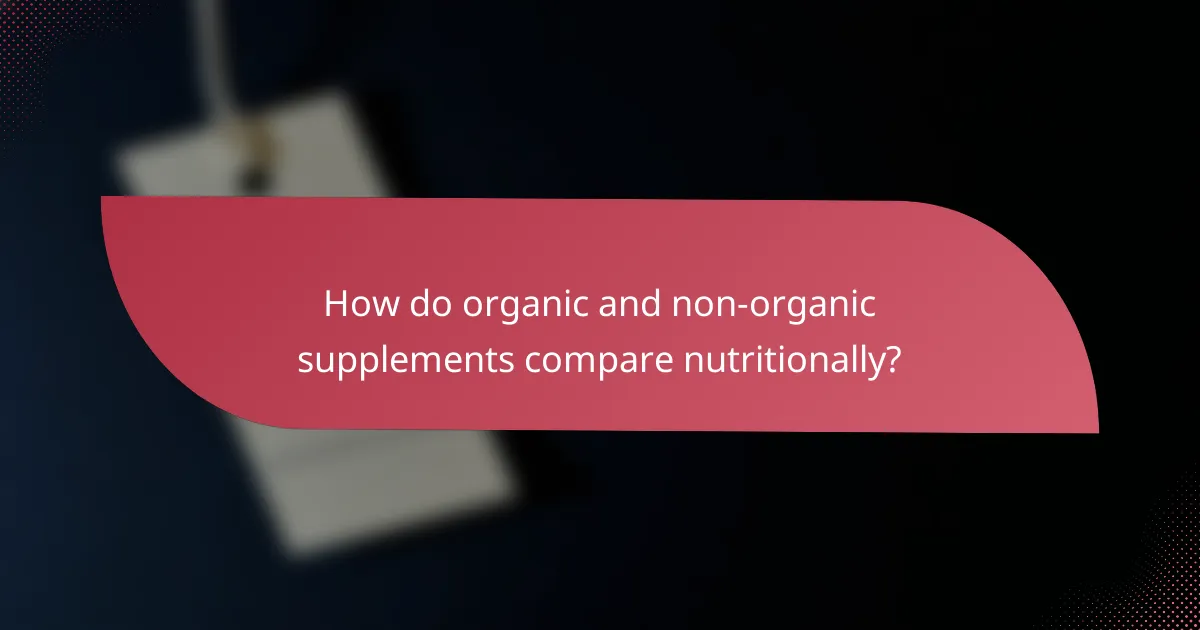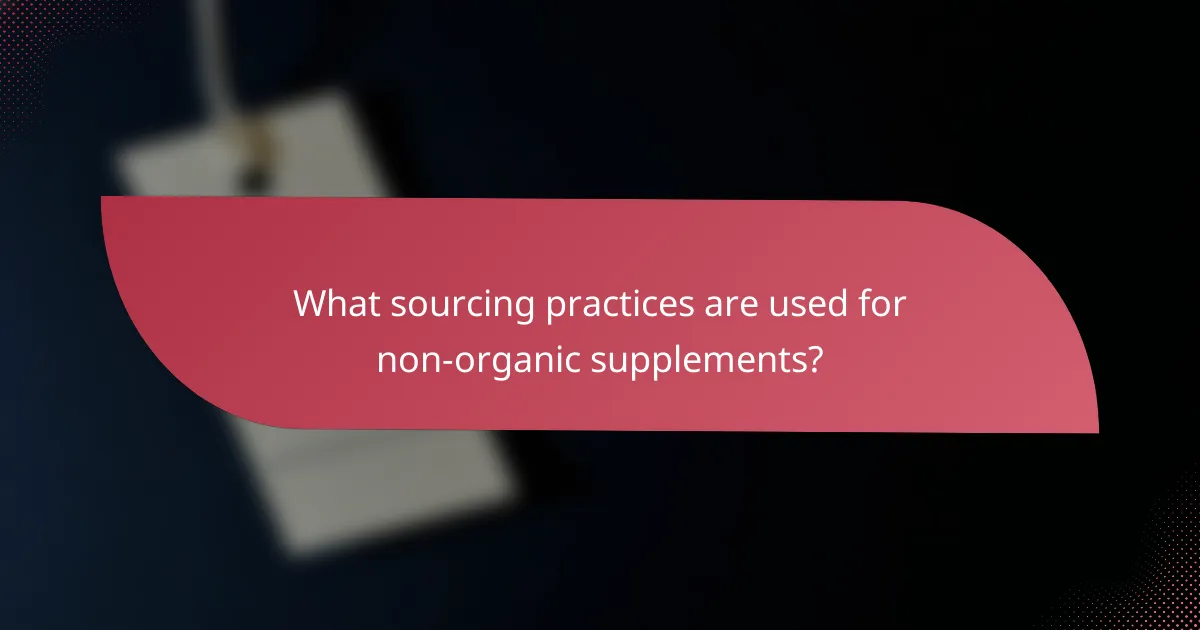The debate between organic and non-organic supplements centers on their benefits, nutritional value, and sourcing methods. Organic supplements are derived from natural farming practices, often resulting in higher nutrient levels and fewer chemicals, while non-organic options provide cost-effectiveness and consistent quality. Understanding these differences can help consumers make informed choices about their nutritional needs.

What are the benefits of organic supplements?
Organic supplements offer numerous advantages, including enhanced nutritional value and reduced exposure to harmful chemicals. They are sourced from organic farming practices that prioritize natural methods, which can lead to better health outcomes.
Higher nutrient density
Organic supplements often contain a higher concentration of vitamins, minerals, and antioxidants compared to their non-organic counterparts. This is primarily due to the soil health and farming practices used in organic agriculture, which promote nutrient-rich crops.
For example, studies suggest that organic fruits and vegetables can have up to 30% more antioxidants. When selecting supplements, look for those that specify organic certification to ensure higher nutrient density.
Lower risk of chemical exposure
Choosing organic supplements significantly reduces the risk of exposure to synthetic pesticides, herbicides, and fertilizers. Organic farming standards prohibit the use of these chemicals, making organic products safer for consumption.
For individuals concerned about chemical residues, opting for organic supplements can provide peace of mind. Always check for third-party testing or certifications that confirm the absence of harmful substances.
Better for environmental sustainability
Organic supplements contribute positively to environmental sustainability by promoting biodiversity and reducing pollution. Organic farming practices focus on maintaining healthy ecosystems and minimizing environmental impact.
By supporting organic supplement brands, consumers can help foster sustainable agricultural practices that benefit the planet. Look for labels that indicate compliance with recognized organic standards to ensure your choices support sustainability efforts.

What are the benefits of non-organic supplements?
Non-organic supplements offer several advantages, including cost-effectiveness, broader availability, and consistent quality control. These factors make them appealing options for consumers seeking nutritional support without the premium price tag often associated with organic products.
Cost-effective options
Non-organic supplements typically cost less than their organic counterparts, making them accessible to a wider audience. Prices can vary, but consumers might find non-organic supplements priced 20-50% lower, depending on the brand and formulation.
This affordability allows individuals to incorporate supplements into their daily routines without significant financial strain. For those on a budget, non-organic options can provide essential nutrients at a fraction of the cost.
Wider availability
Non-organic supplements are generally more widely available than organic ones. They can be found in various retail outlets, including supermarkets, pharmacies, and online stores, making it easier for consumers to find what they need.
This increased accessibility means that individuals can purchase non-organic supplements without having to search for specialty stores, which may be required for organic products. This convenience can save time and effort, especially for those with busy lifestyles.
Consistent quality control
Non-organic supplements often undergo rigorous quality control processes to ensure safety and efficacy. Manufacturers typically adhere to established industry standards, which can help guarantee that products meet specific potency and purity levels.
While organic supplements may have stricter sourcing regulations, non-organic options can still provide reliable nutritional value. Consumers should look for products that have been tested by third-party organizations to confirm quality and safety.

How do organic and non-organic supplements compare nutritionally?
Organic and non-organic supplements differ in their nutritional profiles, primarily due to the sourcing and processing methods used. Organic supplements often contain higher levels of certain vitamins and minerals, while non-organic options may include synthetic additives that can affect overall nutrient quality.
Differences in vitamin and mineral content
Organic supplements typically boast a higher concentration of vitamins and minerals compared to their non-organic counterparts. This is often attributed to the use of natural farming practices that enhance soil quality and nutrient density in plants. For instance, organic fruits and vegetables may have up to 30% more antioxidants than non-organic varieties.
However, the specific nutrient content can vary widely based on the supplement type and brand. It’s essential to check labels for detailed information on vitamin and mineral concentrations to make informed choices.
Impact on bioavailability
Bioavailability refers to the extent and rate at which the active ingredients in supplements are absorbed and utilized by the body. Organic supplements often have better bioavailability due to the absence of synthetic fillers and additives, which can hinder nutrient absorption. Natural compounds in organic products may also enhance the body’s ability to utilize these nutrients effectively.
For example, certain organic vitamins may be more readily absorbed than their synthetic equivalents, making them a preferable choice for individuals seeking optimal health benefits. Always consider how the body interacts with different forms of nutrients when selecting supplements.
Variability in ingredient sourcing
The sourcing of ingredients plays a crucial role in the nutritional quality of both organic and non-organic supplements. Organic supplements are derived from plants grown without synthetic pesticides or fertilizers, often leading to cleaner and more nutrient-rich products. In contrast, non-organic supplements may contain ingredients sourced from various locations, sometimes resulting in lower quality due to the use of chemical treatments.
When choosing supplements, look for certifications such as USDA Organic for organic products, which can provide assurance about ingredient sourcing and quality. Understanding where and how ingredients are sourced can help consumers make better choices aligned with their health goals.

What sourcing practices are used for organic supplements?
Organic supplements are sourced from farms that adhere to specific agricultural practices aimed at promoting sustainability and avoiding synthetic chemicals. These practices ensure that the ingredients used in organic supplements are grown and processed in a way that maintains their natural integrity.
Certified organic farms
Certified organic farms must meet strict guidelines set by regulatory bodies. These farms avoid the use of synthetic pesticides, herbicides, and fertilizers, opting instead for natural alternatives. This commitment to organic farming helps ensure that the supplements produced are free from harmful chemicals.
In the United States, for example, the USDA oversees the certification process, requiring farms to undergo regular inspections to maintain their organic status. This certification provides consumers with assurance regarding the quality and safety of the supplements they purchase.
Regulations and standards
Organic supplements are governed by regulations that vary by country but generally require adherence to specific agricultural practices. In the European Union, for instance, the EU Organic Regulation outlines the standards for organic farming and processing, ensuring that products labeled as organic meet rigorous criteria.
These regulations often include restrictions on genetically modified organisms (GMOs) and mandates for organic feed for livestock. Understanding these standards can help consumers make informed choices about the supplements they select.
Traceability of ingredients
Traceability is a crucial aspect of sourcing organic supplements, allowing consumers to know the origin of the ingredients. Organic certification typically requires detailed record-keeping from farm to shelf, ensuring that every step of the supply chain adheres to organic standards.
Consumers can often find information on sourcing practices on product labels or company websites, which can help them verify the organic claims. This transparency is essential for building trust in the quality of the supplements they choose to support their health.

What sourcing practices are used for non-organic supplements?
Non-organic supplements are typically sourced using conventional agricultural practices that may involve synthetic chemicals and global supply chains. These methods can impact the nutritional value and safety of the supplements, making it essential to understand their sourcing practices.
Conventional farming methods
Conventional farming methods for non-organic supplements often include the use of pesticides, herbicides, and fertilizers that can enhance crop yields. These practices may lead to higher production rates but can also leave chemical residues on the final products. Consumers should be aware that these methods may compromise the environmental sustainability of the farming practices.
Farmers may also rely on monoculture, where a single crop is grown extensively, which can deplete soil nutrients over time. This can affect the overall nutritional quality of the supplements derived from these crops.
Use of synthetic additives
Non-organic supplements frequently contain synthetic additives, such as artificial colors, flavors, and preservatives, which are used to enhance product appeal and shelf life. While these additives can improve the appearance and longevity of supplements, they may not provide any nutritional benefits and could pose health risks for some individuals.
It’s important for consumers to read labels carefully and consider the potential effects of these synthetic ingredients on their health, especially if they have sensitivities or allergies.
Global supply chains
The sourcing of non-organic supplements often involves complex global supply chains that can affect product quality and traceability. Ingredients may be sourced from multiple countries, which can introduce variability in standards and regulations. This can make it challenging for consumers to assess the safety and efficacy of the supplements they choose.
To mitigate risks, consumers should look for brands that provide transparency about their sourcing practices and adhere to recognized quality standards. This can help ensure that the supplements they purchase are safe and effective.

How to choose between organic and non-organic supplements?
Choosing between organic and non-organic supplements involves evaluating your health goals, dietary preferences, and budget. Organic supplements typically contain fewer synthetic additives and pesticides, while non-organic options may offer a wider variety at lower prices.
Assessing personal health goals
Your personal health goals significantly influence the choice between organic and non-organic supplements. If you prioritize clean, natural ingredients and aim to avoid chemicals, organic supplements are often the better choice. Conversely, if you are focused on specific nutrients or cost-effectiveness, non-organic supplements may better meet your needs.
Consider what you hope to achieve with supplementation. For instance, if you are looking to improve overall wellness, organic options may provide a more holistic approach. However, if you require targeted support, such as higher doses of specific vitamins or minerals, non-organic supplements might offer more effective solutions.
Evaluate your dietary restrictions and lifestyle. For example, if you follow a strict organic diet, it may be beneficial to align your supplements accordingly. On the other hand, if you are flexible with your dietary choices, non-organic supplements can provide a broader range of options without compromising your health goals.



